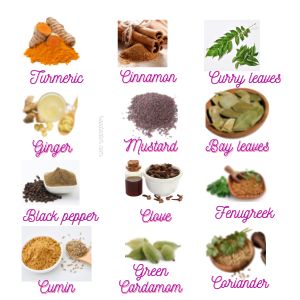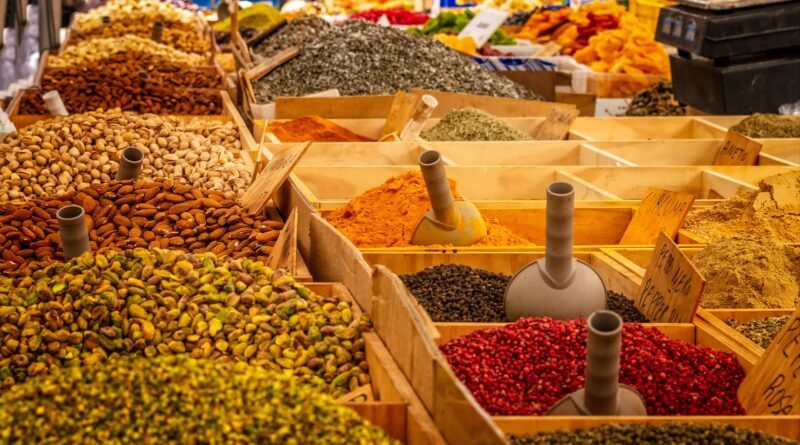12 Amazing Indian Spices best for Digestive system

What are spices?
Spices are aromatic and flavorful plant products that are used to add flavor, color, and aroma to food. They are typically the dried parts of plants such as seeds, fruits, roots, bark, and leaves, which are then ground or used whole to season food.
Spices have been used for thousands of years as a way to enhance the flavor and nutritional value of food, as well as for their medicinal properties. Some commonly used spices include cinnamon, cumin, ginger, turmeric, coriander, cloves, and black pepper.
There are different forms in which spices can be used, such as whole, ground, dried, or fresh. Some of the commonly known spices include cinnamon, nutmeg, cumin, coriander, ginger, turmeric, cardamom, clove, paprika, pepper, and saffron.
Spices are said to have originated in India and are widely used in Indian cuisine. Over the years, traders have transported these flavorings from India to other countries, making them a popular ingredient in different types of cooking.
For centuries, spices have been used not just for flavoring but also for their medicinal properties. They are believed to have various benefits such as anti-inflammatory, antioxidant, anti-bacterial, and anti-viral properties.
Moreover, spices are also thought to aid in digestion and strengthen the immune system. In this article, we will be highlighting 12 of these spices that can promote a healthy gut.
What are the other uses of Spices?
Spices are not just limited to culinary purposes; they have been used for various other purposes as well. Here are some other uses of spices:
Medicinal purposes: Spices have been used for centuries for their medicinal properties, and many of them are believed to have healing effects on the body. For example, turmeric is known for its anti-inflammatory properties and is used to alleviate pain and swelling.
Aromatherapy: Many spices are used in aromatherapy to help promote relaxation and alleviate stress. For example, the aroma of cinnamon is believed to help reduce stress and anxiety.
Cosmetics: Spices are also used in cosmetics for their fragrance and medicinal properties. For example, clove oil is used in toothpaste because of its antibacterial properties.
Pest control: Spices are also used as a natural pest control agent. For example, peppermint oil can help repel insects such as ants and spiders.
Dyeing: Some spices are used to dye fabrics and materials. For example, turmeric is used to give a yellow color to fabrics.
Overall, spices have various uses beyond their culinary purposes, and their beneficial properties have been recognized for centuries in different cultures around the world.
Where and how do we use these spices?
Spices can be used in a variety of ways, depending on the spice and the dish you are preparing. Here are some common ways to use spices:
Whole: Some spices are used whole, such as cinnamon sticks, cardamom pods, and cloves. These can be added to stews, soups, and hot drinks to infuse their flavors.
Ground: Most spices are ground and added to dishes to flavor them. For example, ground cumin can be used to make curry dishes, while ground cinnamon can be used in baking and desserts.
Fresh: Some spices, such as ginger and turmeric, can be used fresh by grating or chopping them. These can be added to stir-fries, soups, and marinades.
Dry roasting: Some spices are dry roasted before being ground to bring out their flavor. For example, whole cumin seeds can be dry roasted in a pan before being ground and used in recipes.
Infusions: Spices can also be used to make infusions, such as tea or spiced wine. For example, cinnamon sticks can be simmered in wine or cider to make a warm and fragrant drink.
Overall, spices can be used in various ways to add flavor and nutrition to your dishes. You can experiment with different spices and try different combinations to create your own unique flavors.
What are the Health Benefits of Spices?
Spices have been used for centuries for their medicinal properties, and they are known to have numerous health benefits. Here are some of the health benefits of spices:
Anti-inflammatory properties: Many spices, such as turmeric, ginger, and cinnamon, have anti-inflammatory properties that can help reduce inflammation in the body.
Antioxidant properties: Spices are rich in antioxidants, which help protect the body against damage caused by free radicals.
Digestive health: Spices can help improve digestion and prevent digestive problems. For example, ginger and peppermint can help alleviate nausea and bloating.
Immune system support: Spices can help boost the immune system and protect the body against infections. For example, garlic has antibacterial and antiviral properties that can help prevent infections.
Blood sugar regulation: Some spices, such as cinnamon and fenugreek, can help regulate blood sugar levels and may be beneficial for people with diabetes.
Heart health: Spices like garlic, turmeric, and cumin can help lower blood pressure and cholesterol levels, reducing the risk of heart disease.
Cognitive health: Some spices, such as turmeric and saffron, have been shown to have cognitive benefits and may help improve memory and brain function.
Overall, incorporating spices into your diet can have numerous health benefits, but it is important to use them in moderation and as part of a balanced diet.
12 Amazing Indian Spices best for Digestive system are :-

- Ginger: Ginger is a natural anti-inflammatory agent that can help reduce inflammation in the gut and relieve digestive discomfort. It also aids digestion by stimulating the production of digestive enzymes.
- Turmeric: Turmeric is another natural anti-inflammatory spice that can help reduce inflammation in the gut. It has also been shown to improve digestive function by increasing the production of bile, which aids in digestion.
- Cinnamon: Cinnamon is a natural digestive aid that can help reduce bloating and gas. It also has antimicrobial properties that can help fight off harmful bacteria in the gut.
- Fennel: Fennel is a natural carminative that can help reduce bloating and gas. It also contains compounds that stimulate the production of digestive enzymes.
- Coriander: Coriander is a natural digestive aid that can help reduce digestive discomfort. It also has antimicrobial properties that can help fight off harmful bacteria in the gut.
- Cardamom: Cardamom is a natural carminative that can help reduce bloating and gas. It also aids digestion by stimulating the production of digestive enzymes.
- Peppermint: Peppermint is a natural digestive aid that can help reduce digestive discomfort. It also has antimicrobial properties that can help fight off harmful bacteria in the gut.
- Cloves: Cloves are a natural digestive aid that can help reduce digestive discomfort. They also have antimicrobial properties that can help fight off harmful bacteria in the gut.
- Mustard: Mustard is a natural digestive aid that can help stimulate the production of digestive enzymes. It also has antimicrobial properties that can help fight off harmful bacteria in the gut.
- Cumin: Cumin is a natural digestive aid that can help reduce digestive discomfort. It also aids digestion by stimulating the production of digestive enzymes.
- Black pepper: Black pepper is a natural digestive aid that can help reduce digestive discomfort. It also aids digestion by stimulating the production of digestive enzymes.
- Asafoetida: Asafoetida is a natural carminative that can help reduce bloating and gas. It also aids digestion by stimulating the production of digestive enzymes.
Conclusion :-
In conclusion, spices are an important part of many cuisines around the world and have been used for centuries for their medicinal properties and unique flavors. From anti-inflammatory and antioxidant properties to digestive and immune system support, spices have numerous health benefits. They can be used in various forms, including whole, ground, dried, or fresh, and can be incorporated into a wide range of dishes. However, it is important to use them in moderation and as part of a balanced diet. So, adding a variety of spices to your meals can not only make them taste delicious but also provide several health benefits.
For such health update please click here




